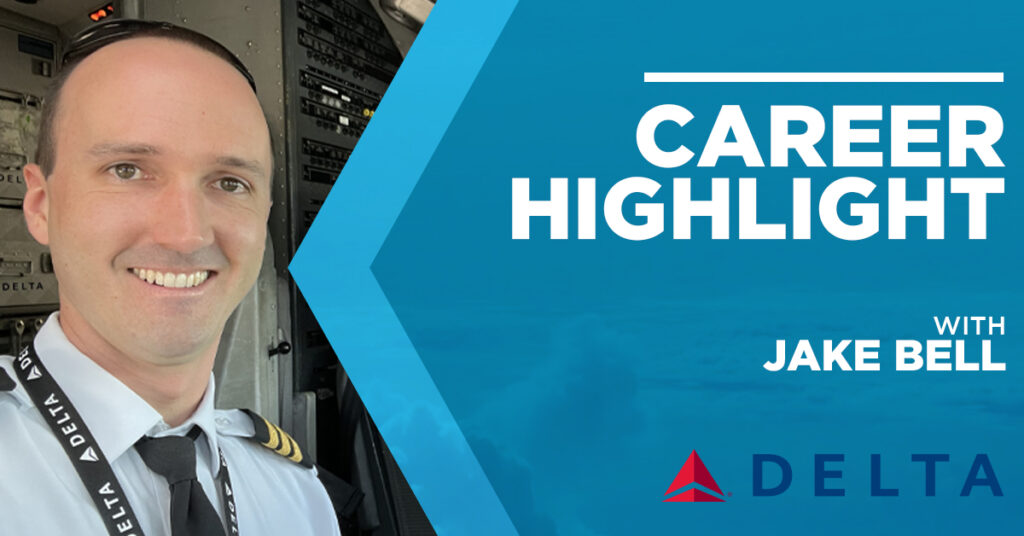It is hard to find someone more enthusiastic about aviation than Jake Bell. From his participation on the Danville-Boyle County Airport Board to fulfilling his role in the aviation industry at large as a pilot for Delta Airlines – Jake plays an integral role in advancing the exciting world of flight both locally and abroad. We had the opportunity to ask Jake about his experiences and aviation journey…
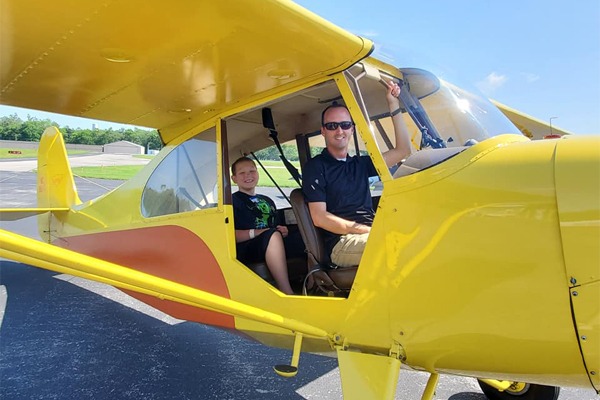
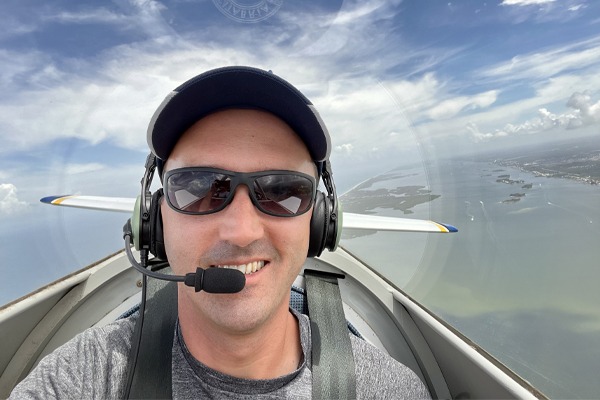
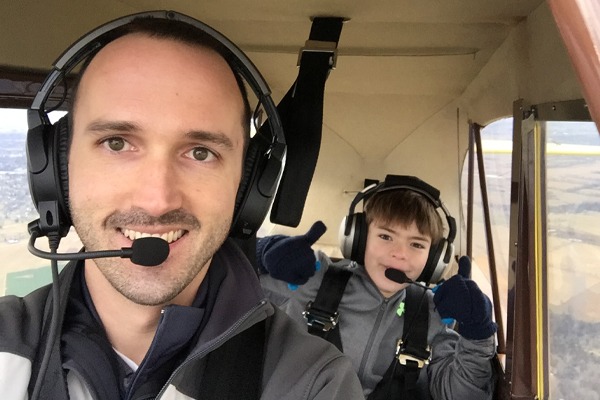
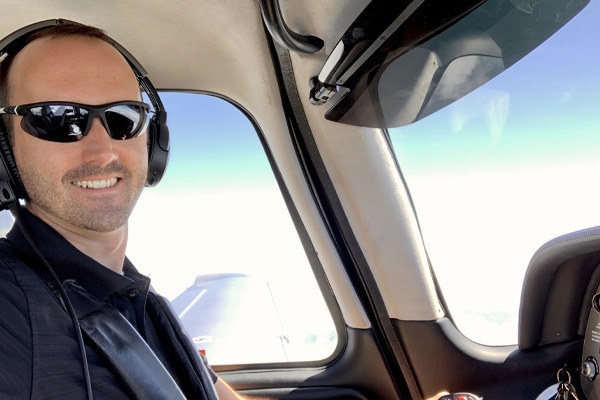
Tell us a little about your aviation background and how you developed an interest in aviation.
I don’t really remember a time when I didn’t want to fly. I think my interest in aviation was initially sparked as a young kid when I took a helicopter ride over the Smoky Mountains. Every time we visited the Smokies, I wanted to go watch the tour helicopters. My parents also took me to the Danville Airport regularly to watch airplanes. As we got to know the pilots at DVK, I began to spend more and more of my time there watching airplanes and bumming airplane rides whenever I could. I still remember my first airplane ride at DVK in a Citabria that was owned by the airport manager at the time. This eventually turned into being hired to work at the airport part-time when I was in high school. This is when I began to think I wanted to make a career out of flying airplanes.
Thinking about your day job, what requirements were there in taking on the role of a Delta Airlines pilots?
Becoming a pilot at Delta (any airline, really) requires an Airline Transport Pilot certificate with a multi-engine rating, as well as at least 1,500 hours of flying experience (typically much more for a job at a major airline, including pilot-in-command time in a turbine airplane). When I was hired, the airlines also required a college degree. Once a requirement, a degree is now only preferred at most airlines. I earned a degree in Aerospace Administration at Middle Tennessee State University.
What does a typical day at work look like for you?
It’s hard to describe a typical day as an airline pilot. I fly domestically (including Canada), so my typical day generally consists of more flights that a pilot who flies internationally. We “bid” for monthly schedules based on our seniority. A more senior pilot gets more of what they want each month (types of trips, layovers, days off, etc.) than a junior pilot. Domestic airline pilots will typically operate 1 to 4 flights per day. Some days are straight forward and easy, while others will present a number of challenges. In the summertime, we deal with thunderstorms and windshear on a regular basis, while in the winter we deal with deicing procedures, in-flight icing, and slick and contaminated runways. We also deal with passenger, mechanical and flight planning challenges year-round. You never know what you may encounter on a day at work.
That seems like a lot of responsibility for sure - but what about the rewards?
There are plenty of rewards that come with flying the general public. We enjoy hearing that we’re taking passengers to weddings, graduations, reunions, and vacations. I enjoy inviting kids up into the cockpit to look around. I remember being 7 or 8 years old and being invited up to look in the cockpit of a TWA 727 (I still have the plastic wings the pilots gave me that day), so being able to make that same impact on a kid’s day strikes me as particularly rewarding.
What seems to be the biggest challenge for you in your career as an airline pilot?
Flying professionally does offer its share of challenges, the biggest of which is time spent away from home. Most airline pilots fly 3 to 4 day trips, and most will fly 4 to 5 trips per month. Planning your schedule around personal commitments at home can be a challenge, especially for junior pilots. We are also required to pass recurrent training every 9 months, are subject to random observations from company and FAA personnel, and have to pass a physical exam every year. Maintaining your skill set to meet the requirements of the company is a challenge, but one I enjoy.
Is there a particular quality or character trait that you feel serves someone well with your occupation?
Patience, both throughout flight training and as a professional pilot. Often in aviation, things don’t go as planned, and it often takes a lot of patience to deal with changes as they develop. I’ve noticed that pilots with less patience often are subject to far more stress than those who are able to effectively cope with curveballs.
What makes aviation so interesting for you?
I’ve been lucky to fly many types of aircraft all over the country, from gliders and antique airplanes to helicopters and jets, but the most interesting flying I do is getting to take a kid up for their first flight. I give several Young Eagles flights each year and this is probably the most rewarding flying I do. Seeing their smile and hearing them say “this is so cool!” right after takeoff makes all the hassle of learning to fly worth it.
Are there any memorable moments that stand out for you across your career or flying in general?
I’ve been lucky to experience several incredible things while flying, but one trip stands out in particular. I have always had an immense interest in the space program and would always make it a habit to watch Space Shuttle launches. When it was announced that the shuttle program would come to an end, I decided I wanted to see a launch in person. I owned a Cessna 150 at the time and flew that airplane down to Florida one summer to watch what was supposed to have been the final launch of the Space Shuttle Atlantis (after the launch, they decided to fly it a couple more times). The flight down was one of my first long, solo cross county trips after getting my license, and the experience of seeing a Space Shuttle launch from only a few miles away was awesome. It was a tremendous experience.
How do you feel about the current state of the aviation industry as an airline pilot?
Much of the aviation industry, and especially the airlines, operate on a boom and bust cycle. The airline industry has been on a significant boom cycle lately, with airlines hiring and growing at record rates. I think that will return to levels that have been more normal historically. Recently, pilots have been progressing from flight instructing to flying for a major airline in just a few years, with only an intermediate stay at a regional airline. That will slow back down some, but that’s no reason for alarm. I was hired at a regional airline during a much slower time in the industry and spent 8.5 years there before being hired at a major and things have worked out just fine for me, so that’s nothing to be afraid of.
If you could talk to the younger version of yourself, is there anything you would say or encourage him to do differently?
As far as aviation-related advice goes, I wish I had started an electronic logbook early in my flying. That would have made airline and insurance applications so much easier for me. And for life advice in general, I’ve learned that you often regret the things you didn’t do more than the things you did. If you have an opportunity, take it.
You've already come so far in your journey and career, what goal or dream do you still have to look forward to?
I have a very long aviation bucket list, including getting a seaplane rating in Alaska, adding a helicopter rating one day, and flying as many aircraft types as possible (I’m currently at 98).
Sounds great! Last question - what is your favorite airplane?
Probably my RV-4. It flies like a dream, and I can fly it anytime I want. I think the best looking airplane ever built is the Lockheed Constellation.
Jake’s story and experience serve as just one voice across the vast number of aviation professionals and enthusiasts spread across Kentucky. Be sure to be on the lookout for additional interviews and insights into the many career opportunities presented by our state’s aviation community!

